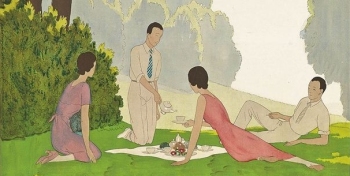 HISTORY HISTORY
THE
ELTHAM PARK PSA SOCIETY AND ITS ORCHESTRA
The
following is taken from some reminiscences of Thomas G.
Bunce, Secretary 1949-2005, written in 1999.
Unfortunately,
we do not know exactly when our Meetings began. The
earliest Minute Book rescued from a fire at Eltham Park
Methodist Church refers to previous minutes, but sadly
these are mussing.
However,
hearsay has suggested that in 1919 meetings for men, a
Brotherhood, began. The ladies had already started a
Sisterhood in 1916 under the presidency of Mrs L.F.
Church. The Sisterhood met regularly for many years, but
eventually closed. The Brotherhood survived, although in
a changed form. A 1922 register in our archive records
120 names with a weekly attendance of about 65. In 1926,
our name changed to 'Eltham Park Pleasant Sunday
Afternoon', which permitted us to invite the ladies. Our
present title of 'Eltham Park Brotherhood and PSA
Society' was adopted in 1953.*
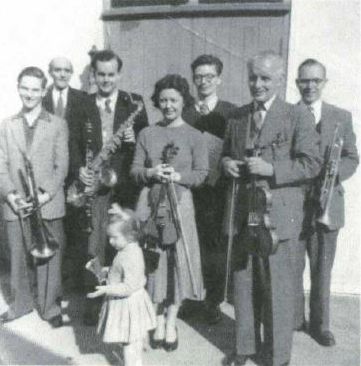
Members of the
Orchestra, probably outside the old church hall,
in October 1958 |
|
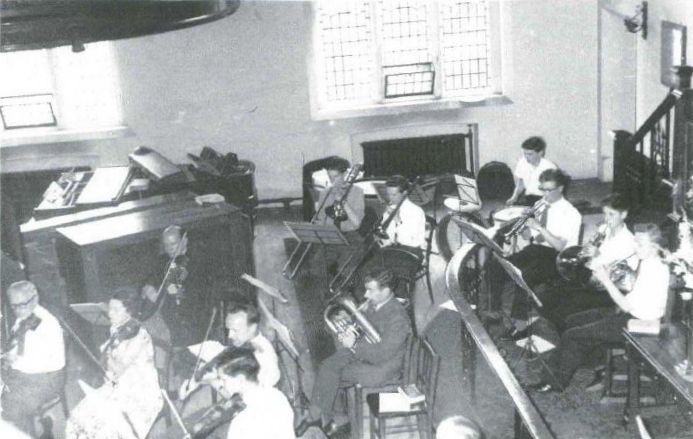
A Pleasant Sunday
Afternoon Concert 26th July 1959 |
| (click on pictures to enlarge) |
I think I joined about 1924 or 1925. I
would have been 12 or 13 years old, certainly in short
trousers, I recall. A Miss Whittingham had suggested to
my father that I might join the orchestra and play my
violin.
At
one time our Society had its social side, with outings to
places of interest, also a Drama Society and our Scottish
Dancing evenings, even a cricket team.
We
no longer meet every Sunday afternoon – just on the
last Sunday of each month except for breaks during August
and December. The Orchestra rehearses every Tuesday
during the season.
Through
the Orchestra we are able to help some charities, and
have entertained folk in the Spitalfields area and tried
to brighten the lives of many in circumstances of
poverty.
We've
played at the Well Hall Pleasaunce, Sutton-at Hone,
Eltham Palace, the Palace Cinema in Eltham High Street
and the Lewisham Theatre. In 1963, the Orchestra played
at the Leas Cliff Hall, Folkstone, as part of the
Methodist Association of Youth Clubs (MAYC's)
celebrations before an audience of nearly 1,000. It has
played at several London Federation Rallies.
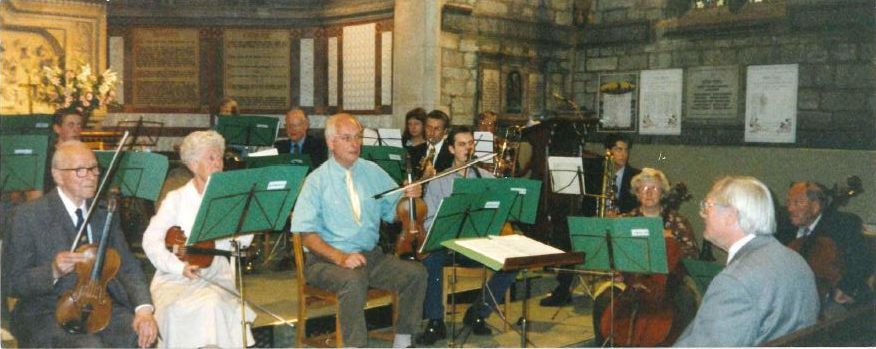
Chislehurst
Methodist Church c.2000
(click on picture to
enlarge)
For
a number of years, the Orchestra played for Christmas
Carol Concerts at Woolwich Town Hall arranged by the
North Kent Federation of Townswomen's Guilds. We have
also been able to help various charitable organisations
including Overseas Mission and for the TocH, providing
entertainment for handicapped people, thereby
endeavouring to use music as a means to an end rather
than an end in itself.
In
1975, BBC Radio 4 Sunday Programme contained an interview
the Society's Secretary (that’s me) as part of the
Brotherhood Movement's Centenary Celebrations. The
programme concluded with a few bars of our orchestra's
music played from a tape recording which my son Graham
had made.
When
I joined the Society, Mr. W.H. Hurlstone was Musical
Director, followed by Mr. Clarence H.E. Maggs, who later
handed over to me. In turn I handed over to Ewart Cotton,
then to our current Musical Director, Ted Williams, with
Martin Bunce as Principal Deputy.
Our
Registrar is Mr. Bill Mills who took over on the death of
his wife Florrie Mills. The orchestra has had a number of
accompanists over the years; one of the most loyal and
brilliant being our present accompanist, Tom Wade, whose
wide Ann Wade is Leader of the Orchestra.
Our
present PSA Chairman is Ernie Lake who opens our meetings
with a reading from the scriptures and a prayer. Miss Ivy
Hunter is our Treasurer, who took over this task on the
retirement of Mrs Kathleen Brown. We are indebted to all
those who help toward the smooth running of the Society.
Several
players from the orchestra later became professional
musicians, and from time to time we see the names of one
or two mentioned on television programme credits.
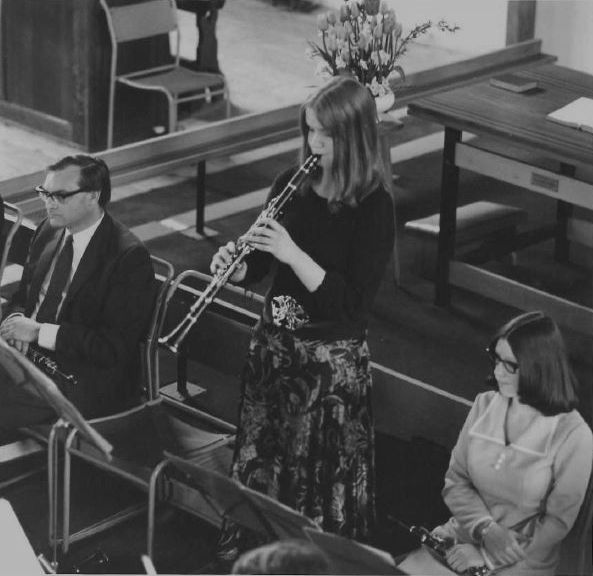
Anne
Dudley (centre), whose credits include The Full Monty,
Bright Young Things, Les Miserables (film); Jeeves and
Wooster, Kavanagh QC, Poldark (TV) with Ted Williams
(left) and Annette Wade (right) in 1973
(click on picture to
enlarge)
Two
World Wars and changing times have inevitably affected
the National Movement, and to some extent its former
strength has diminished. The ease of modern travel and
the distractions offered by today's materialistic age
have all had their effect on the habits of many people.
Nevertheless,
the Movement and the Society at Eltham Park will, we
hope, continue to fulfil a need, reaching over barriers
of religious denominations and political parties, and be
a place where youth and age can meet and understand one
another through music and a common desire to serve
others.
Ted
Williams, former Musical Director and current Vice
President wrote a postscript in 2007:
Bill
Mills died in 2000, Ivy Hunter died in 2005, Heather
Corps (flute and Deputy Conductor) died in 2006, Roy Rudd
(Deputy Chairman) died in 2005.
Tom
Bunce died in September 2005 aged 93, the perfect
gentleman and true Christian, Secretary to the Society
for many years, accomplished trumpeter, organist,
pianist, violinist and conductor. A good friend to many.
*The
word 'Brotherhood' was dropped in 2020.
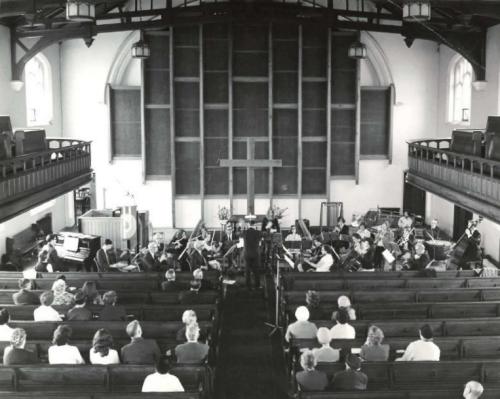
The Eltham Park
Brotherhood and PSA Orchestra in 1973, part way through
the internal alterations to Eltham Park Methodist
Church.Conductor: Tom Bunce, Leader: Ewart Cotton,
Accompanist: Tom Wade
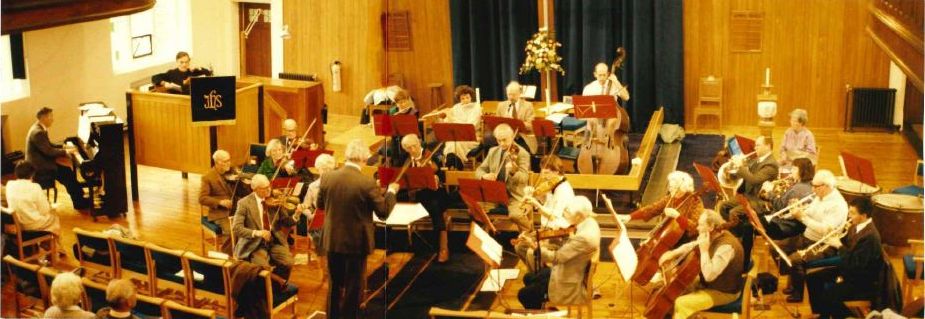
A Pleasant Sunday Afternoon Concert 31st January 1993
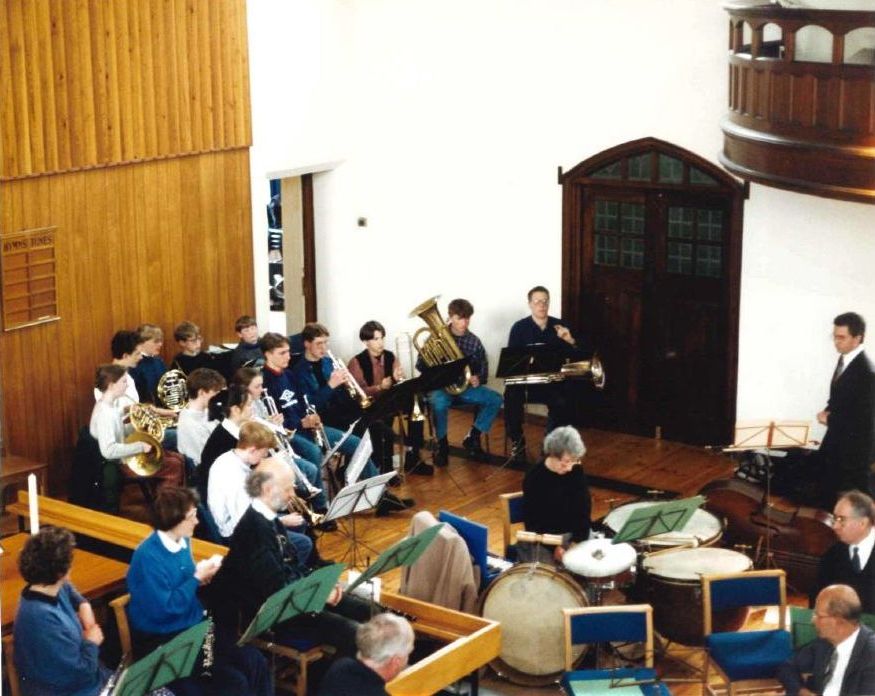
Guest Artists - Sedgehill School Brass Ensemble led by
Martin Bunce (far right) 26th March 1995
(click on pictures to enlarge)
THE
BROTHERHOOD AND SISTERHOOD MOVEMENT
By
affiliation through the London Federation, we are part of
the National Brotherhood and Sisterhood Movement. The
Movement began when a man named John Blackman, a deacon
of Ebeneezer Congregational Church, West Bromwich,
started Christian meetings for men, which were to be
brief and brotherly. This year was 1875. Sundays were
more like holy days than the holidays they have become.
People really worked hard six days and rested on the
seventh. Just imagine, no shops open, no cinemas, no
radio or television, no motor cars, (unless you had a
steam-driven one). Daimler was experimenting with a new
manufactured substance petroleum. There were no
telephones, (Alexander Graham Bell's experiments took off
a year later in 1876). There was no Salvation Army, that
wonderful organisation started three years later in 1878.
There was no National Health Service; that came after
World War II. I recall a visit to the doctor costing 3/6,
(17½p) or if you called him out, 7/6 (37½p).
The
Movement spread to London, crusades were made to France,
Belgium and Canada. Subsequently, the work spread to
Switzerland, Australia, New Zealand and South Africa and
a World Brotherhood Federation was established in London.
A Sisterhood Movement was established in 1912 which is
now part of the National Brotherhood and Sisterhood
Movement (Inc). Much practical work was done by both
Brotherhoods and Sisterhoods, there being no Social
Services as we know them today.
During
World War I, special campaigns were organised nationally
to send relief to the overrun countries of Europe, and
through Brotherhood agencies on the continent money, food
and clothing were sent and distributed. Orphaned children
from Serbia whose parents had been casualties of the
onrush of German forces, needed shelter and food in
England, and this was organised. 170 were cared form
until thet could be returned to their own land.
Also,
during the General Strike in 1926, the Movement proved
its position as a national force being instrumental in
bringing together the leaders of the Employers Federation
at a meeting in the Mansion House in London, presided
over by the Lord Mayor of London, a Brotherhood man.
Arising from this Conference was convened and brought
about a new spirit to industrial relations.
Many
unemployed men came to London seeking work only to find
disillusionment and despair. To meet a great need, men of
the Brotherhood's London Federation organised themselves
into friendship groups visiting the Thames Embankment and
the London parks to talk with men and to try to alleviate
their sad plight. Clothing and Boot Centres were set up
and arrangements made to supply sausage and mash meals
for the destitute. Members of our own Society at Eltham
Park played their part in visiting the slums of London.
The Sisterhoods organised a 'Safety for Girls' service
which offered a friendly escort service to young girls
from the provinces seeking work in London. The service
continued for many years under the title 'Friendship for
Girls'.
With a
much smaller population in those days, the main centres
of attraction were the churches, public houses and
theatres. An Elementary Education Act had been in 1870,
and some education was provided by Church Schools and
Sunday Schools. My father's parents had to pay 3d a week
for him to go to school, later reduced to 2d a week.
Daytime meetings on Sundays were often well attended.
Sankey and Moody’s Mission attracted 4,000 at
Birmingham Town Hall. John Blackham's Brotherhood men's
meetings became Pleasant Sunday Afternoons when
instrumentalists came along.
In 1975,
the Brotherhood Movement celebrated its centenary with
rallies in eight different areas throughout the country.
In the London area, where there were at that time 33
Sisterhoods and 21 mixed meetings or PSA’s, the
largest Rally and Service was held at Westminster Abbey.
|